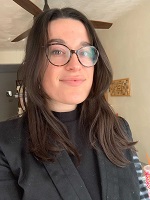Digital Beaumont and Fletcher Bios
Project Team
Claire M. L. Bourne (General Editor) is Assistant Professor and Director of Undergraduate Studies in the English Department at Penn State University. Her teaching and research focus on early modern drama, book history, textual editing, and theatre studies. She is the author of Typographies of Performance in Early Modern England (OUP, 2020) and editor of Shakespeare / Text (Bloomsbury, 2021). She is editing Henry the Sixth, Part 1, for the Arden Shakespeare Fourth Series, and is collaborating with Jason Scott- Warren (University of Cambridge) on a series of projects related to the Free Library of Philadelphia’s copy of the Shakespeare First Folio annotated by John Milton.
Lauren M. Cenci (Graduate Research Assistant) is a PhD student at Penn State. She studies early modern literature, with particular interests in the pastoral, Ovid and the Renaissance, Milton, and commendatory verses. As a research assistant for the Digital Beaumont and Fletcher project, she edited the prefatory poems in the 1647 Beaumont and Fletcher folio.
Heather Froehlich (Project Manager) is the Literary Informatics Librarian at Penn State University, where she supports text and data mining and other digital humanities activities.
Passionate about the spread and advancement of knowledge, Andrew Gearhart (Systems Developer) has been designing, building, and implementing management information systems since 1998. In 2014, Andrew joined the Pennsylvania State University Libraries, as a Systems Developer, where he focuses on implementing systems that support open access publications and other knowledge sharing tools. When not neck deep writing code to develop systems, Andrew is known as a dedicated husband and Dad to three awesome boys.
Taylor Hare (Graduate Research Assistant) is a PhD candidate in English at Penn State University. His primary areas of study are early modern English drama and histories of editing. Digital humanities methods often factor into his scholarship and teaching; he has worked on projects involving literary text encoding and corpus development as well as large-scale topic modeling. As a research assistant for the Digital Beaumont and Fletcher project, he has worked on editions of A Wife for a Month and The Sea Voyage.
David Leblanc (Graduate Research Assistant) is a Ph.D. student in the English Department at The Pennsylvania State University. His research investigates poetry’s role in establishing aesthetic trends that either reinforce or rewrite conceptualizations of nature and human agency in the Anthropocene, particularly Romantic-era poetics that critique the Enlightenment concept of the free-autonomous-subject. His work utilizes Digital Humanities methods, and he was a graduate assistant for the Digital Beaumont & Fletcher project, for which he was lead editor of The Sea Voyage. He has recently launched The Digital Gooden Diaries Project, a project intended to edit, encode, and publish the PSU Special Collection’s James Gooden Diaries in collaboration with PSU’s Open Publishing Department.
Maria Isabel Maza (Graduate Research Assistant) is a Ph.D. candidate in the Department of English at The Pennsylvania State University. Her dissertation examines the image of the non-volitional traveler in 16th- and 17th-century drama and travel narratives. Specifically, Maria Isabel looks at vagrants, impressed soldiers, and religious captives. Her secondary interests include recipe books and book history. As a research assistant for the Digital Beaumont and Fletcher project, she modernized and encoded Fletcher’s and Massinger’s The Spanish Curate.
John Russell (Text Encoding Consultant) is Digital Humanities Librarian and Associate Director, Center for Virtual/Material Studies at the Pennsylvania State University. He is co-editor of the “Exploring Literacies Through Digital Humanities” special issue of dh+lib (2020) as well as author of articles and presentations relating to digital humanities librarianship. He regularly offers online courses on digital humanities for librarians and on text encoding for Library Juice Academy.





